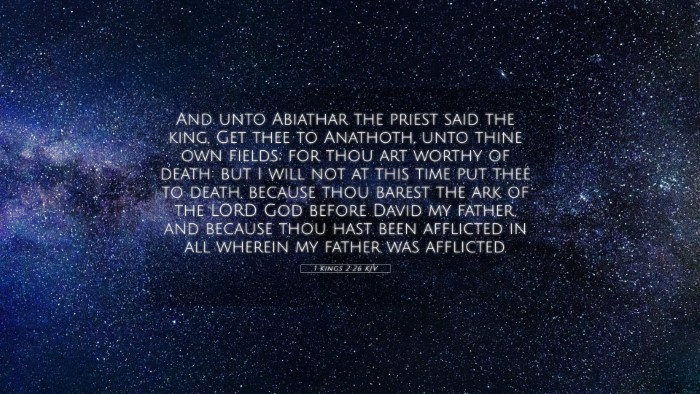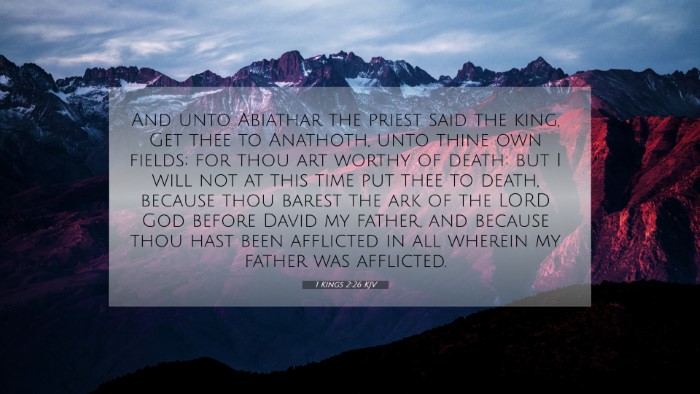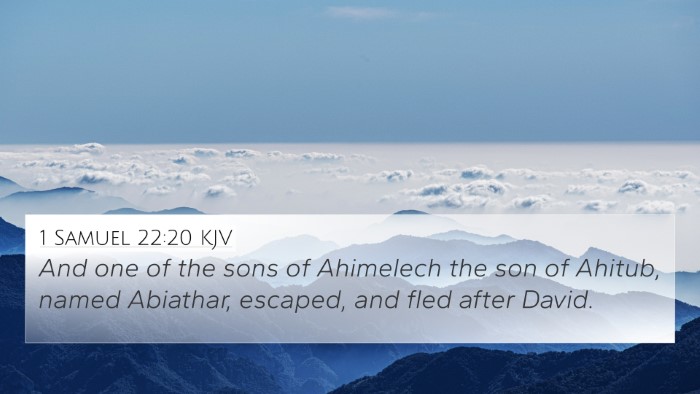Understanding 1 Kings 2:26
1 Kings 2:26 states:
“And unto Abiathar the priest said the king, Go to Anathoth, unto thine own fields; for thou art worthy of death: but I will not at this time put thee to death, because thou bearest the ark of the Lord God before David my father, and because thou hast been afflicted in all wherein my father was afflicted.”
Verse Summary
This verse illustrates King Solomon's decision regarding Abiathar the priest, addressing themes of loyalty, mercy, and the consequences of political actions. Solomon acknowledges Abiathar's previous loyalty to David and makes a distinction between justice and mercy in governance.
Insights from Commentaries
-
Matthew Henry:
Henry emphasizes Solomon’s handling of Abiathar, seeing it as a demonstration of wisdom and cautious leadership. He notes how Solomon's respect for Abiathar's loyalty to David plays a crucial role in his decision to spare the priest, highlighting a balance between justice and grace.
-
Albert Barnes:
Barnes discusses the implications of Abiathar's actions during the succession crisis. He points out that Abiathar's support of Adonijah against Solomon placed him in a position of treason; however, Solomon shows mercy due to the priest's past dedication and service to God’s Ark.
-
Adam Clarke:
Clarke provides a detailed view of the political dynamics in play. He notes how political understanding and personal past relationships influence Solomon’s choices, framing it as a moment where mercy tempers justice, thus setting precedence for Solomon’s reign.
Thematic Connections
This verse connects deeply with various themes throughout the Scripture, such as mercy versus justice, the consequences of political allegiance, and the historical continuity of priestly roles. Below are key Bible verses that interrelate with 1 Kings 2:26:
- 1 Samuel 2:30: God promised to honor those who honor Him, which can be compared to how Solomon honors Abiathar’s past service.
- 2 Samuel 15:35: Abiathar is mentioned in the context of loyalty to David during his flight from Absalom, establishing his past loyalty.
- 1 Kings 1:7: This verse highlights the conflict between Adonijah and Solomon, explaining the priestly dynamics leading to this moment.
- Proverbs 21:15: The relationship between justice and righteousness is reflected in Solomon's decision-making process.
- Luke 6:36: The New Testament reference about mercy echoes the sentiment Solomon displays towards Abiathar.
- 1 Timothy 1:13-14: The notion of mercy and grace even in the face of wrongdoing is a common theme linking back to this situation.
- James 2:13: Mercy triumphing over judgment is a principle that defines Solomon's treatment of Abiathar.
Cross-referencing and Inter-Biblical Dialogue
Understanding 1 Kings 2:26 is enhanced by employing tools for Bible cross-referencing. This method allows readers to explore connections between various scriptures. For scholars and facilitators of scripture study, leveraging a Bible concordance or a cross-reference Bible study guide facilitates a comprehensive examination of theological themes and narrative parallels.
How to Use Bible Cross-References
When attempting to analyze the implications of 1 Kings 2:26, engaging in cross-referencing Bible study methods can yield insights. By identifying connections between the Old and New Testament, such as those seen in the mercy offered in both texts, readers can deepen their understanding of Biblical principles:
- Identify Themes: Observe recurring themes such as mercy, justice, and loyalty across the Bible.
- Examine Contexts: Connect historical events and their theological implications across scripture.
- Utilize Resources: Leverage comprehensive Bible cross-reference materials to assist in your study.
Conclusion
1 Kings 2:26 serves as a profound example of the intricate balance between justice and mercy within Biblical leadership. The insights provided by respected commentaries guide us to appreciate the layered meanings of this verse while cross-referencing it with other scripture reveals its broader significance within the biblical narrative.

















